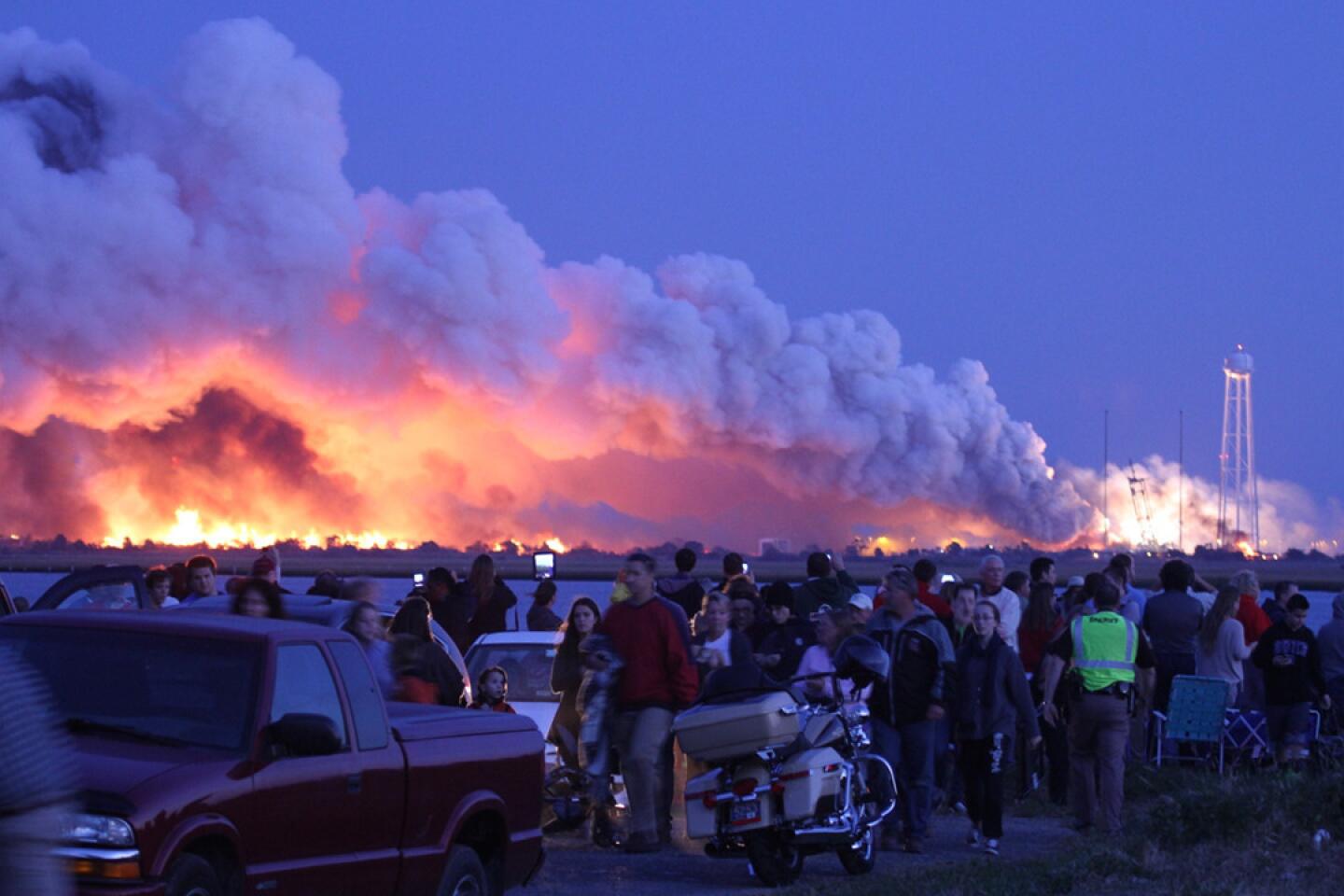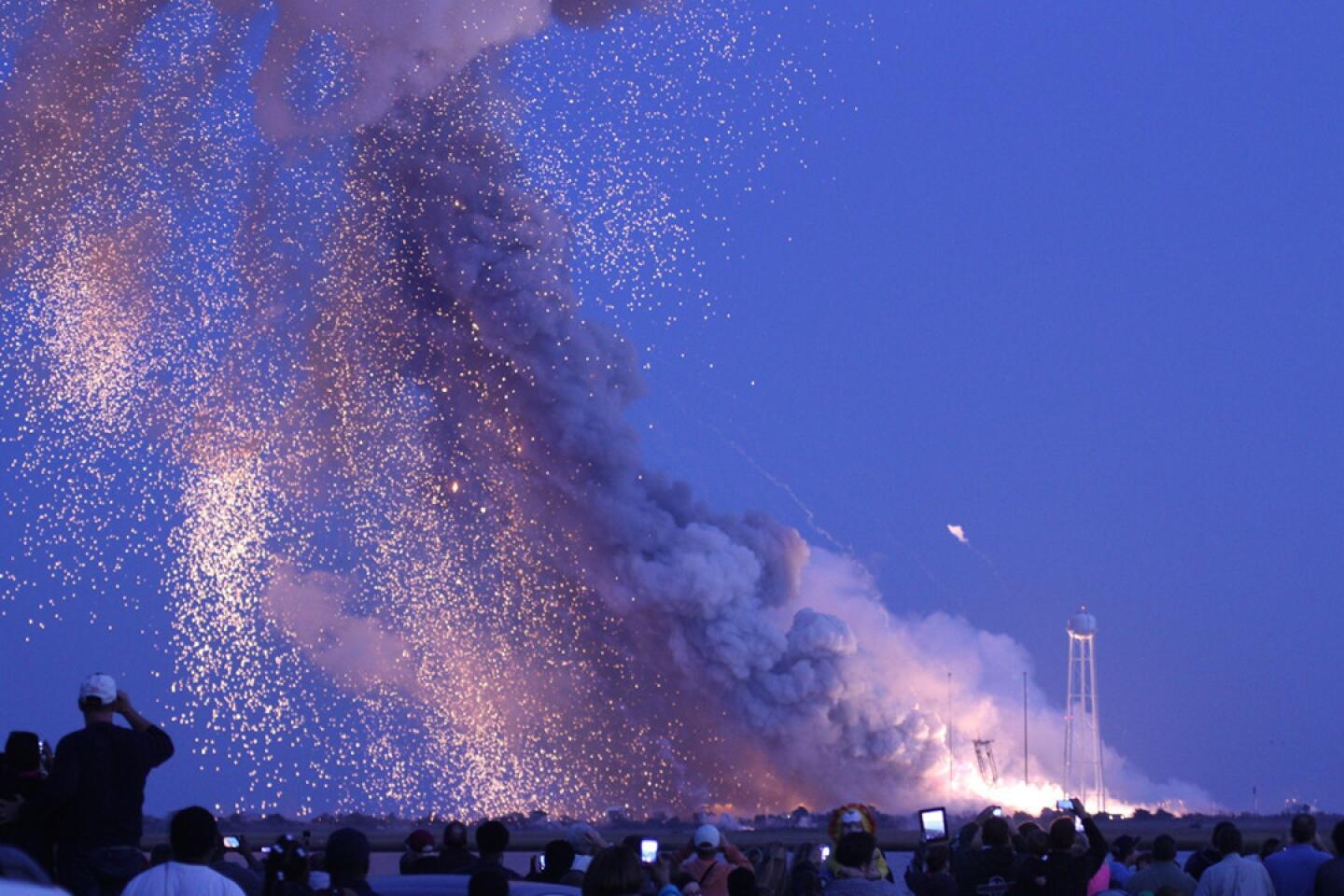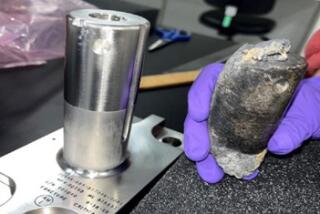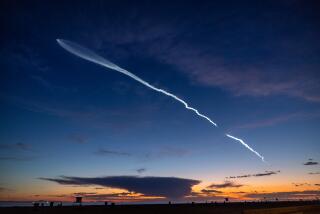Orbital Sciences had a plan to retire rocket engines before explosion
Even before this week’s fiery explosion of an unmanned rocket bound for the space station, executives at Orbital Sciences Corp. had been working on a plan to retire the problem-plagued engines that powered it.
The explosion Tuesday evening, just seconds after liftoff, marked the first time a resupply mission contracted by NASA to a private company has failed.
Orbital’s 13-story Antares rocket was carrying about 5,000 pounds of food, supplies and experiments. The mission would have been Orbital’s third such trip to the space station, according to NASA.
Executives at Orbital said Wednesday that it could take months before they know the cause of the accident that destroyed the $200-million rocket.
But David Thompson, Orbital’s chairman, acknowledged Wednesday that because of recent problems the company had been seeking a replacement for the Russian-made engines that powered the failed launch.
The engines were built in the 1960s and 1970s during an early and unsuccessful attempt by Russia to land cosmonauts on the moon. They had recently been refurbished by Aerojet-Rocketdyne of Canoga Park.
No injuries were reported in the explosion off the Virginia coast.
The astronauts on the space station have supplies that will last for months, NASA said. Just hours after Antares exploded, a planned cargo mission sent by the Russians successfully docked with the station.
Tuesday’s mishap prompted an immediate reaction on Wall Street. Shares of Orbital and GenCorp Inc., the Sacramento-based parent company of Aerojet, fell in trading Wednesday. Orbital’s stock plunged $5.10, or 16.79%, to $25.27. GenCorp’s shares fell 92 cents, or 5.36%, to $16.26.
Analysts said the explosion could lead critics to question NASA’s wisdom of hiring companies to take astronauts and cargo into space.
But industry officials said Wednesday that launching rockets — whether by companies or by the government — was inherently risky.
“It’s rocket science, and it’s never easy,” said Eric Stallmer, the president of the Commercial Spaceflight Federation. “I’m sure questions will be raised, but I don’t think this will change NASA’s direction.”
Until Dulles, Va.-based Orbital determines the cause of the accident and is cleared to launch again, Hawthorne-based SpaceX is the only company with a NASA contract to take cargo into space.
SpaceX is scheduled to take its fifth load of cargo to the space station Dec. 9. It also hopes that the Air Force will soon clear it to compete for launches of military satellites.
Elon Musk, the founder of SpaceX, said in a tweet Tuesday night that he was sorry that competitor Orbital’s launch had failed. “Hope they recover soon,” he wrote.
Unlike Orbital, SpaceX manufactures its own engines.
Orbital contracted with Aerojet to buy 20 of the refurbished Russian engines, which are known as the AJ-26. Aerojet purchased dozens of the powerful engines from Russia in the 1990s.
Even after the reworking, the engines have repeatedly failed. In 2011, one of the engines caught fire during a test at the NASA Stennis Space Center in Mississippi. Executives later said that the 40-year-old metal had cracked, allowing kerosene fuel to leak.
And in May, another engine exploded during a test at Aerojet’s facilities at Stennis. Orbital and Aerojet have not said what caused that failure.
This month, Aerojet told investors it had lost millions of dollars because of the failed test in May. It added that there was “no assurance that the company will not experience any further issues with one or more of the remaining 10 engines” that it was expected to deliver to Orbital.
GenCorp executives did not return messages left Tuesday and Wednesday.
NASA officials said Tuesday that the engines on the rocket that exploded had passed all the required tests.
On Wednesday, Orbital’s Thompson sought to reassure investors that the company would recover from Tuesday night’s explosion and would eventually be able to fulfill the $1.9-billion contract it has with NASA for eight cargo missions to the space station.
“Orbital has experienced adversity in the past,” Thompson said, “ and the company has emerged stronger.” He said he was confident that the company would do that again.
Twitter: @melodypetersen









